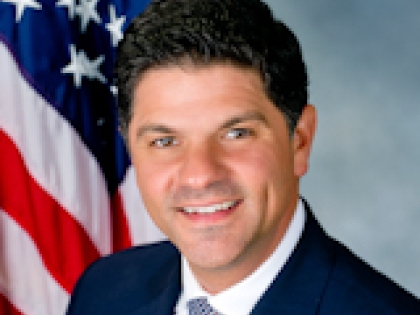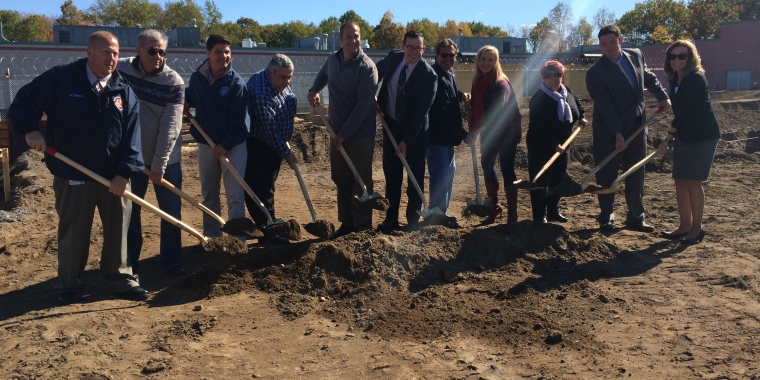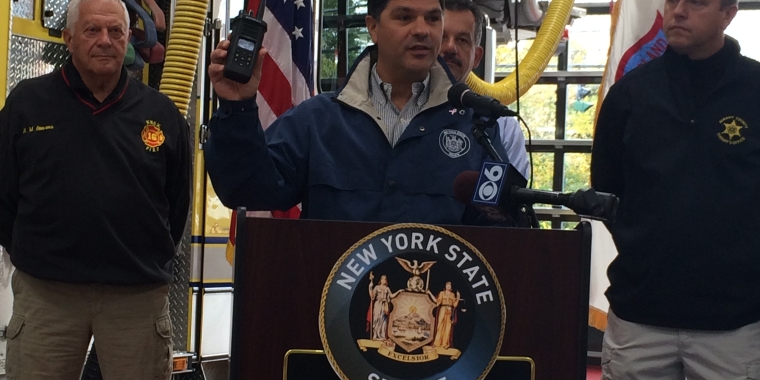
SENATE PASSES 2018-19 BUDGET RESOLUTION THAT CONTROLS SPENDING, PROTECTS HARDWORKING TAXPAYERS
March 14, 2018
The New York State Senate today passed a 2018-19 budget plan that promotes affordability, opportunity, and security for all New Yorkers. This fiscally responsible plan keeps state spending within the two-percent cap and serves as a blueprint for the creation of a better budget and a stronger, safer, and more prosperous New York.
It includes none of the new taxes and fees proposed by the Executive, but instead cuts taxes to create jobs; reduces the state’s high cost of living; provides record levels of funding for education, the environment, and opioid abuse prevention; and addresses the serious public health and safety challenges facing the state’s communities.
AFFORDABILITY
Maintaining Fiscal Discipline
The Senate’s budget protects taxpayers by adhering to a self-imposed two-percent spending cap for the eighth year in a row. Ultimately, capping state spending has saved taxpayers nearly $41 billion on a cumulative basis since the 2010-2011 budget. To help avoid future tax increases, the Senate makes the cap on state spending permanent in law.
Rejecting Tax and Fee Increases
The Senate budget rejects $1 billion in onerous tax-and-fee increases proposed by Governor Cuomo, including new taxes on internet purchases and new DMV fees, and keeps New York State’s promise to businesses by rejecting the proposal to defer business tax credits.
Protecting and Expanding STAR Property Tax Relief:
The Senate’s rejects the Governor’s cap on STAR benefits and extends the property tax rebate check program. It also makes the state’s highly successful property tax cap permanent, continuing the $23 billion already saved by taxpayers. New initiatives to help reduce the local tax burden on taxpayers would:
· Save small businesses $275 million by making small businesses eligible for the STAR property tax savings program; and
· Freeze school property taxes at current levels for many seniors and completely eliminate their school property taxes over the next 10 years.
Protecting Taxpayers from Negative Impacts of Federal Tax Changes
The Senate decouples the state and federal tax codes to prevent New Yorkers from taking a $1.5 billion state tax hit as a result of recent federal tax changes. It holds harmless New Yorkers who may have to pay more in state income taxes because of the changes at the federal level and prevents the state from benefitting from the sudden revenue increase at the expense of taxpayers.
Providing $280 Million in New Energy Tax Relief
The Senate saves business and resident ratepayers $280 million by eliminating the two-percent Gross Receipts Tax on utility bills. It eliminates the base underlying 18-A assessment tax and shifts the cost of the Public Service Commission to the General Fund.
Saving on Retirement Income:
To help more seniors save money and choose to stay in New York during their retirement, the Senate increases the private pension and retirement income exclusion from $20,000 to $40,000 for single taxpayers and to $80,000 for married taxpayers, over three years. This would be the first increase to the exempt amount for private pensions and retirement since 1981 and will save retirees approximately $275 million.
Protecting Toll Payers
The Senate includes a Toll Payer Protection Act that would provide drivers with basic protections as the state continues its transition to cashless tolls and creates a Toll Advisory Task Force to review current toll rates and discount programs. In addition, $3.5 million is restored from Executive Budget cuts in order to maintain the Verrazano-Narrows Bridge toll rebate program for Staten Island residents, and proposes a similar discount for Brooklyn residents.
OPPORTUNITY
Improving Economic Development Programs
The Senate proposal shuts down the under-performing START-UP NY program and redirects $44.5 million in advertising funding to support more effective economic development initiatives.
Providing Tax Relief for Businesses
In addition to creating the STAR benefit for small businesses, the Senate proposes to:
· Reduce the amount small businesses and farms must pay in taxes by raising the corporate tax threshold and lowering the rate, and also raising the personal income tax exemption and threshold for a combined tax savings of $495 million;
· Boost manufacturing by extending the zero percent Corporate Franchise Tax parity to all manufacturers in New York regardless of how they are organized, saving $90 million.
Cutting Red Tape to Encourage Business Growth
The Senate has advanced a comprehensive regulatory reform package to eliminate regulations that are unnecessary and duplicative, preventing businesses from succeeding and growing. The measures curtail the overuse of emergency regulations, improve the accuracy of regulatory “job impact” statements, and help foster more cooperation between regulators and businesses, among other reforms.
Promoting Workforce Development
The Senate’s Task Force on Workforce Development is continuing to improve employee readiness; better meet the workforce needs of private sector employers; connect job seekers with potential employers; retrain those who have lost jobs; and help make New York State’s overall economy more robust, dynamic and resilient. This budget plan rejects the Executive’s proposal to include workforce development as part of the Regional Economic Development Council competition and instead directs any additional resources be made available towards existing proven programs. In addition, the Senate restores and enhances funding cut by the Executive Budget for several of those existing programs, including:
· $4 million for the Workforce Development Institute (WDI);
· $3 million for the WDI manufacturing initiative;
· $1.25 million for the Manufacturing Intermediary Apprenticeship program;
· $980,000 for the Chamber of Commerce On-the-Job Training program;
· $900,000 for Youth Build programs across the state; and
· $650,000 for Building Trades Pre-Apprenticeship programs across the state.
Supporting Agriculture
The Senate includes more than $10 million in Executive Budget restorations and $5.5 million in new funding to support initiatives that will strengthen and preserve agriculture as a chief economic driver in the state. The Senate also adds $5 million for local fair capital costs; $5 million for a competitive grant program for animal shelters; $5 million for the Cornell University College of Agriculture and Life Sciences; and measures outlined in the Majority’s recently released “Growing Strong” plan to help strengthen family farms and create new jobs in the agriculture industry.
Increasing Education Funding to Help Children Succeed
The Senate’s education budget includes an approximately $1 billion - 3.8 percent - increase in school aid funding over last year, bringing the total investment in schools to a record level of $26.1 billion. Other highlights include:
· More than doubling the Governor’s Foundation Aid proposal with $379 million in additional funding, for a total increase of more than $717 million in 2018-19;
· Providing flexibility for Community Schools funding;
· Fully funding expense base aids at $240.4 million;
· Creating an Education Investment Tax Credit that provides new tax incentives designed to encourage charitable giving to schools and improve the quality of education for students;
· Removing a cap on charter schools; returning to the original basic tuition formula and providing additional tuition; expanding the definition of rental costs to cover all expenses associated with rent, and increasing charter rental assistance to 40 percent from 30 percent;
· Continuing support for last year’s $5 million in funding for STEM initiatives in non-public schools, and creates a new formula with no cap to reimburse non-public schools’ STEM teacher salaries beginning in the 2019-20 school year; and
· Increasing non-public schools’ mandated services aid by $5.4 million as the Executive Budget proposed, and restoring $7 million in immunization funding. The Senate also continues $15 million in security grants for non-public schools and allows those schools to participate in programs funding the placement of School Resource Officers.
Preparing Students For Bright Futures Through Higher Education
The Senate restores the Executive Budget’s $200 million cuts to SUNY capital and includes an additional $55 million each for SUNY’s and CUNY’s capital programs. The measure also advances a five-year capital plan for SUNY and CUNY to make new investments in the state’s higher education institutions. It increases base aid funding for community colleges by $100 per FTE to help prevent tuition hikes, and $2 million was restored for childcare centers at community colleges to help working parents succeed in school. To support New York’s Bravest, the Senate includes a measure allowing firefighters to take up to two CUNY courses that pertain to their line of work for free.
The proposal also restores a $35 million cut to Bundy Aid in the Executive Budget so that more private college and university students can access financial aid, and it expands the ability for private schools to participate in the STEM Scholarship program.
Increasing Support for Local Roads and Bridges
The budget proposal maintains the Senate’s commitment to parity between the DOT and MTA capital plans, and ensures long-term regional balance in the funding of transportation projects. It would:
· Provide an additional $27 million in State operating assistance for non-MTA downstate and upstate transit systems, for a total of $552 million, a six percent increase over last year;
· Add $65 million for the Consolidated Local Street and Highway Program (CHIPS), for a total of more than $503 million;
· Restore $50 million for the Local BRIDGE NY program, for a total $150 million;
· Provide $12 million to increase the reimbursement rate to cities for maintaining State highways;
· Restore $20 million in capital assistance for non-MTA downstate and upstate transit systems;
· Restore $4 million for rural transportation systems negatively impacted by Medicaid reimbursement changes; and
· Restore $10 million for the Aviation Capital Grant Program, for a total $27 million.
SECURITY
Providing Record Support for Heroin and Opioid Abuse Prevention and Treatment
The Senate increases the state’s support for opioid use disorder-related services to a new record of $265 million - going beyond the 2018-19 Executive Budget proposal of $228 million. In addition, the Senate includes measures to: reduce exposure to opioids for children and adults; limit and provide alternatives to opioid use; better define controlled substances to include deadly drugs like fentanyl; screen expectant mothers to prevent and treat addiction in infants; encourage the successful recovery for those struggling with addiction; and provide law enforcement with new tools to help get drugs and big-time dealers off the streets.
Improving School Security
Last week, the Senate passed a critical school safety package that would strengthen security and help keep students safe. This budget incorporates many of those initiatives:
· Requires the assignment of a police officer to every school within the City of New York during instructional hours;
· Requires every public and private school to conduct at least two active shooter drills during the school year;
· Reimburses schools for participating in a new School Safety Program at their option whereby teachers and school personnel are equipped with personal safety alarms that would, when triggered, connect to local police departments, fire stations, and medical assistance providers;
· Establishes a School Resource program available for any public, non-public, or charter school, or BOCES in order to provide improved public safety and or security on school grounds. Such officers would be allowed to possess firearms while performing their duties. Costs for having school resource officers would be aidable for BOCES and charter schools;
· Develops a grant program for school resource officers whereby non-public schools would be reimbursed for the costs of the salaries for school resource officers;
· Allows School Safety Improvement Teams to review procedures for safety and make on-site inspections of school district, BOCES, non-public school, and charter school facilities. Any improvements made by a school based on a recommendation from the school safety improvement team would be an aidable expense;
· Allows schools to use and be reimbursed for a software program in conjunction with security and safety technology platforms;
· Establishes state reporting requirements of school counselors, school social workers, and school psychologists and recommendations on how to improve the ratios of those professionals to students;
· Creates a School Mental Health Program Services Coordinator to identify, report, and address issues of student mental health in public and non-public schools; and
· Creates a comprehensive school security grant program for the total capital costs of quick capacity smart sensor threat detection and 360-degree security awareness.
Taking Additional Actions to Protect Children
The resolution reaffirms the Senate’s strong support for amendments to both the civil and criminal statutes of limitations to further protect children from dangerous sexual predators.
Increasing Counter-Terrorism Resources
To better prepare law enforcement with improved counter-terrorism resources, the budget includes an additional $10 million in funding for the purchase of new technology. Local law enforcement agencies could purchase drones with offensive and defensive capabilities and advanced weapon detection systems, among other equipment to protect communities.
IMPROVING PUBLIC HEALTH AND NEW YORKERS’ QUALITY OF LIFE
Transforming Health Care Delivery Statewide
The Senate is increasing the Health Care Facility Transformation Program funding from the Executive Budget’s $425 million to $500 million in order to boost a new third round of awards and help ensure long-term sustainability for facilities as they adjust to the changing dynamics of health care in New York. In addition, the Senate rejects the Executive’s Medicaid cuts to hospitals and nursing homes and increases the amount of funding available for new capital projects. It also provides an additional $157 million in support to SUNY hospitals to restore cuts in the Executive Budget and provide them with full Medicaid Disproportionate Share Hospital (DSH) payments.
Investing in Women’s Health
The Senate is significantly increasing the state’s commitment to providing women with access to quality medical care. It will restore $475,000 cut in the Executive Budget and include more than $4.5 million in new funding for a total of $5 million that will be used to support initiatives like breast cancer prevention, education, and support, and prenatal and postpartum services, among others.
Preventing Lyme Disease
The Senate Task Force on Lyme and Tick-Borne Diseases has been instrumental in restoring $400,000 in Executive Budget cuts and including an increase of $800,000 for a total of $1.2 million to support the Task Force’s recommendations.
Protecting the Environment and Critical Water Resources
The Senate continues its longstanding support for the Environmental Protection Fund at a record $300 million. It also allocates up to $5 million of last year’s historic $2.5 billion Clean Water Infrastructure Act for an Emerging Contaminant Contingency Fund to address public water systems that have confirmed one or more emerging contaminants at a potentially harmful level. As part of the Clean Water Infrastructure Act an additional $20 million is directed towards lead service line replacement projects. In addition, the Senate directs funding from the EPF to support a new SUNY Stony Brook laboratory testing facility or equipment for PFOA and other chemicals, and increases public access to the Governor’s planned initiative to combat harmful algal blooms.
Supporting Veterans
The Senate restores more than $6.125 million in Executive Budget cuts for veterans initiatives including:
· More than $3 million for the Joseph P. Dwyer Veteran Peer to Peer Services Program and adds nearly $450,000 in new funding for a total of $3.5 million;
· $750,000 to support field service operations conducted by Congressionally Chartered Veterans’ Service Organizations;
· $450,000 for the Veterans Mental Health Training Initiative;
· $300,000 for Warrior Salute;
· $250,000 for the New York State Defenders’ Association Veterans’ Defense Program;
· $250,000 for Legal Services of the Hudson Valley’s (LSHV) Veterans and Military Families Advocacy Project;
· $250,000 in additional funding for the Veterans’ Outreach Center in Monroe County;
· $125,000 for the Veterans of Foreign Wars Department of New York;
· $100,000 to expand the LSHV Veterans and Military Families Advocacy Project into Westchester County;
· $100,000 for SAGE Vets Program; and
· $50,000 for Vietnam Veterans of America New York State Chapter.
Assisting Seniors
In addition to the tax relief referenced above, the Senate restores Executive Budget cuts and provides additional resources to allow seniors continued access to long-term services and supports, such as home care, transportation and meals, and initiatives to prevent elder abuse. The budget includes:
· $20 million increase in the state Supplemental Security Income allowance for individuals living in enhanced residential facilities, raising reimbursement $4 per day for the first year, for a total increase of $20 per day over the next five years;
· $3.6 million in addition to the $22.3 million in the Executive Budget for the New York Connects program, which provides free comprehensive services and supports for seniors and caregivers;
· $500,000 restoration for the Community Services for the Elderly program, which provides essential in home services to the elderly, allowing seniors to maintain their autonomy and thrive at home in their communities;
· $200,000 restoration for the continuation of elder abuse prevention and education initiatives, protecting older adults from abuse, maltreatment, and financial exploitation; and
· Establishment of a statewide, toll-free telephone number (hotline) to receive elder abuse reports 24 hours a day, seven days per week.
The Senate’s budget resolution includes all funds spending of $168.5 billion. The total for state operations spending is $99.9 billion – an increase of just 1.83 percent over 2017-18.
###
Share this Article or Press Release
Newsroom
Go to Newsroom
Senator Amedore Secures Funding for Stone Ridge Library
October 1, 2015
